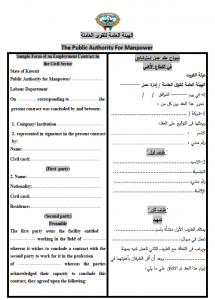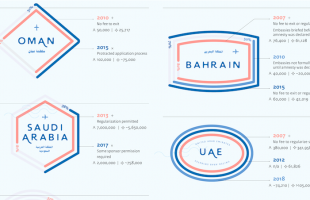After months of promising a unified contract for workers in the private sector, Kuwait’s Public Authority for Manpower (MPA) finally put the unified contract into effect in January 2016. The authority said this contact aims to limit disputes between employers and workers by guaranteeing a standard for their work relationship and conditions. The 16 clauses of the unified contract are based on an interpretation of the 2010/6 law of labor regulations of the private sector.
Migrant-Rights.org obtained a copy of the new contract (read the PDF copy here). The MPA will be the third party in each contract, making it mandatory for employers to co-sign the contract with their workers and submitting a copy to the authority for reference. There is no mention of adopting an electronic contract system, which would be accessible to all parties. Workers will be provided signed copies of their contracts.
 The contract template is set in Arabic and English. Clause no. 15 of the contract mandates that the two parties can choose a second language other than Arabic for the contract. The Authority has also stated that all embassies and consulates were provided with the contract in order to translate it into other languages. In court disputes, however, Arabic will be the reference language. The authority does not provide legal aid or translators in court cases.
The contract template is set in Arabic and English. Clause no. 15 of the contract mandates that the two parties can choose a second language other than Arabic for the contract. The Authority has also stated that all embassies and consulates were provided with the contract in order to translate it into other languages. In court disputes, however, Arabic will be the reference language. The authority does not provide legal aid or translators in court cases.
The clauses of the contract contain essential terms such as job description, 100 days probation period during which the worker can be fired, and the monthly wage. As for the period of the contract, it is left to the discretion of two parties. Workers must give written consent to have their contracts renewed.
As for working conditions and rights, the contract specifies 8 hours of daily work with a one-hour break. This workload cannot exceed 48 hours a week. The official contract states that workers can get their annual leave after 9 months of work. They are also entitled to insurance and must be provided with tickets when leaving the country at the end of their contracts.
A report by al-Anba’a last September stated workers would be given an extra 50% of their regular daily rate, when working overtime. They would also be given a paid day off work if they have worked overtime, in addition to their weekly off; and 30 days minimum of annual leave. The report also says employers must deposit salaries to employees’ bank accounts. All these details were not mentioned in the official contract, yet they are part of the labor law regulating the private sector.




